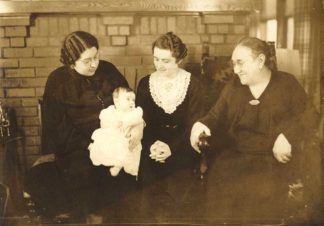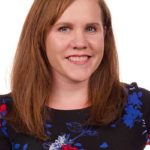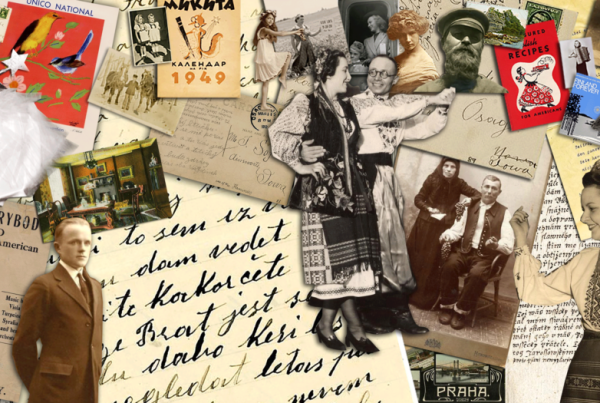By Allison Campbell-Jensen

Four generations of a Jewish women in this photo from 1937. From left: Eleanor Laurie, baby Arlene Bomberg, mother, Alyce Bomberg, and Jenny Smith. (Upper Midwest Jewish Archives)
More than 27 people signed up for a Zoom webinar on Saving Your Family History earlier in April. Good timing was part of the reason for the strong interest, says Susan Weinberg, president of the Minnesota Jewish Genealogical Society.
“People are closed in their homes right now — and getting into the tasks that they have been putting off for years and years. . . . All the things you meant to do are staring you in the face.”
For archivist Kate Dietrick, head of the Nathan and Theresa Berman Upper Midwest Jewish Archives at the University of Minnesota, creating the webinar was a great way to reach a group of people who may not typically think of visiting the archives, while also answering the questions she fields regularly from individuals. An important part of her archive’s mission is to collect materials and document the Jewish community in Minnesota and the Dakotas, where Jewish people are a minority and members of a marginalized community that has suffered from anti-Semitism.
Archival at-home tips
Some of the work of archives can begin in people’s homes, with their own gathering and sorting materials. For those thinking about ways to save their family history, the number-one message, says Dietrick, is: “Make sure your stuff is not in your garage.”
Or in your basement . . . or anywhere subject to water leaks . . . and not inserted into the peel-and-place plastic-covered pages of photograph albums so popular in the 1970s and 1980s. Along with citing the do-nots, Dietrick also included plenty of encouragement and positive steps for her special Zoom audience on April 12.
Arriving in front of a new audience
While she has presented often, for Dietrick this Zoom webinar was a new way to reach people. It began by her responding to an appeal from TC Jewfolk, an online media website, to a variety of Jewish organizations to provide skill-sharing or other online content during this #StayAtHome period.
Dietrick answered the call, “thinking this was a really good opportunity for me to go where I haven’t gone before.” During the Zoom meeting, she did, she says, see a new, different audience than at past presentations that took place at the Elmer L. Andersen Library on campus. And a few people who missed the webinar followed up with her via email. She also says she appreciated that those who may have mobility issues seemed to have no problem attending online.
Walter Elias, who attended the webinar and is a past president of the Minnesota Jewish Genealogical Society, says he deeply appreciated his past opportunities to visit the archives and hopes those in attendance will do so in the future. He found Dietrick’s presentation very well done.
It starts with story-telling
“We are doing much the same thing,” Elias says. “But genealogy is family-oriented and the archivist is more community-oriented.”
He adds:” I think story is the important thing. We can collect birth, death, and vital records until the cows come home but the really interesting thing about family history are the stories. What was life like for your family in the 1800s or the 1750s? . . . What were the rituals and the ceremonies? If you can tease that out, then you’ve really struck gold in genealogy.”
Dietrick, too, emphasized choosing stories as a way to focus while organizing family photographs, letters, scrapbooks, and other materials.
R U a DIYer?
Dietrick closed the formal presentation with a list of links, including a U of M guide called Preservation Resources, compiled by Kate Brownrigg of the Minnesota Library Access Center. The rich resources webpage includes an online course, Preservation 101, book repair assistance, and links to the Northeast Document Conservation Center’s collection of leaflets on planning, storing, and reformatting materials.
The stories of ordinary people are important to family members and may also belong in archives, says Weinberg. “Don’t assume what you have wouldn’t be of interest to an archive just because you aren’t famous.”
Archives are no longer ivory towers, far from daily life in what they collect and in who may use them, Dietrick says. “Archives have changed drastically in the last 10 to 20 years,” she says, “especially in terms of outreach.” Their doors have opened; archives now are inclusive places.
Dietrick says she would be pleased if the result from outreach like this were that “everyday people feel empowered to use the archives.”
After a 2005 survey revealed that a large portion of our cultural and information heritage held in libraries, other institutions and homes is at risk, the American Libraries Association and its Association for Library Collections and Technical Services in 2010 launched Preservation Week.
In 2020, the focus is on oral histories, which capture experiences with immediacy and impact. You may listen to oral histories at the U of M Libraries via the Tretter Collection Transgender Oral History Project and the Immigration History Research Center Archives. You may wish to learn more about how to record oral histories remotely via this webinar recording from the Oral History Association and list of resources and tips , both shared by Tretter Oral Historian Myrl Beam.
While Preservation Week ends May 2, the urge to continue saving our stories continues. With topics from Personal Digital Archiving to handling textiles, an extensive list of past Preservation Week webinars is available online. And, if you wish to record an oral history of your response to COVID-19, the Minnesota Historical Society offers you that opportunity online.




